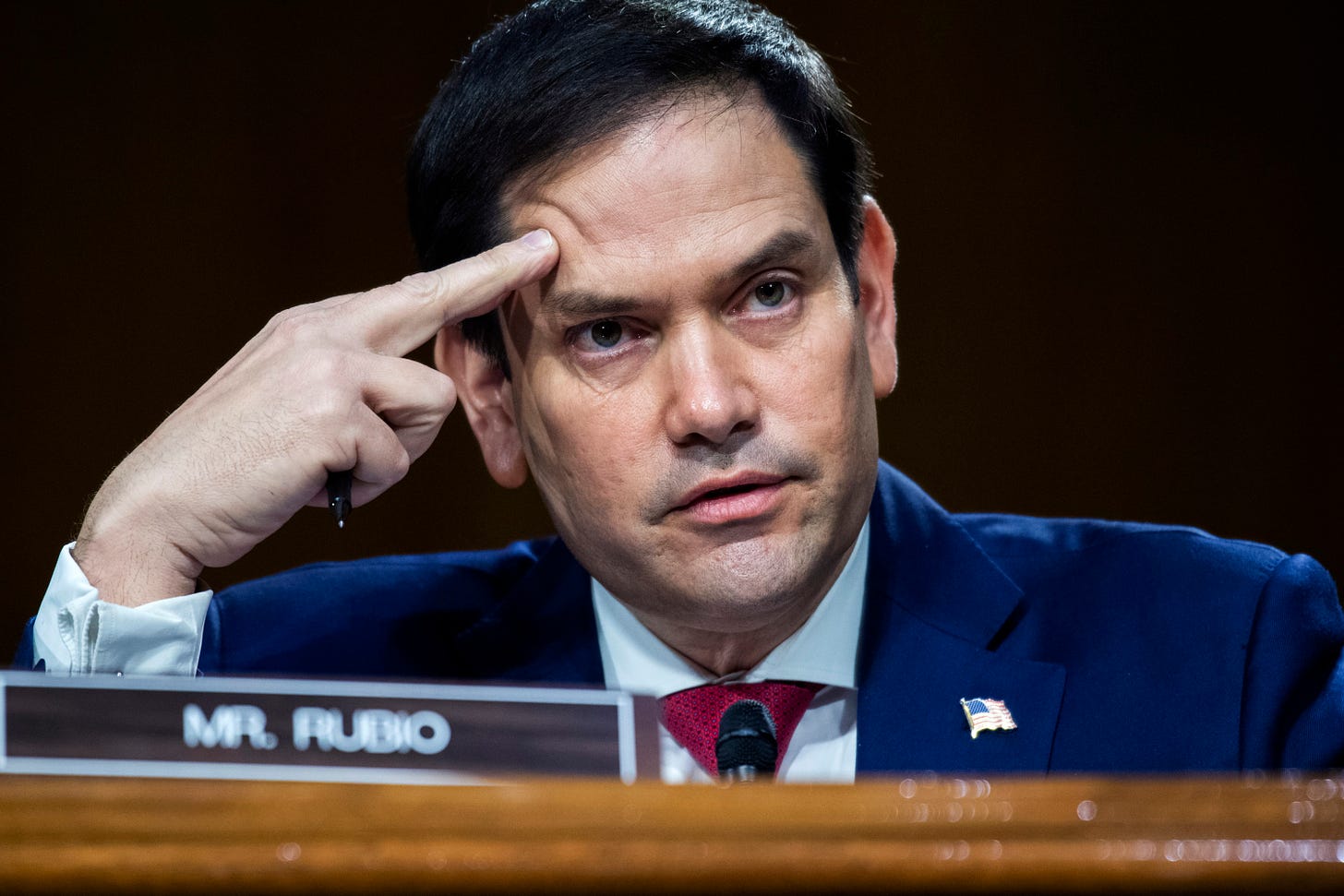Marco Rubio Goes Occupy Woke Street
He can’t really strike a blow against wokeism, so he strikes a pose instead.
Last week, Senator Marco Rubio proposed a piece of legislation straight out of the Occupy Wall Street playbook. Now, if you ask Rubio about this—and he’s sure hoping you will give him more time on TV!—he will claim he is being serious.
But he isn’t.
The bill Rubio has proposed is called the Mind Your Own Business Act. It is ostensibly about telling corporations to mind their own business. In reality, it is about empowering Americans to meddle in others’ business.
First, some background: A publicly traded company is owned, fractionally, by a large number of people—sometimes millions of people. A stock corporation holds elections for its board of directors and everyone who owns shares typically has an opportunity to cast a vote, both for the board and on various issues proposed by the board or by fellow shareholders.
Activists have long used shareholder meetings as a means to push companies to change, or at least to try to embarrass them. But Rubio has a different idea in mind. His bill would basically pierce the protections of business judgment to make executives liable if they did anything that a shareholder considered “woke,” and would flip the burden of proof to the corporation to prove that whatever woke action was in the best interest of the corporation.
Directors of corporations have a fiduciary duty to the corporation and its shareholders, and sometimes people make decisions that don’t pan out. The business judgement rule serves as a form of protection, though not absolute; it holds that boards should be presumed to be operating in good faith and in the interests of the corporation and not their own self interest.
Rubio calls his proposal “a private-sector solution to the problem of woke corporations.” But what it really is is an unserious proposal with lots of potential unintended consequences. Even though its ends are professedly anti-woke, its means sound like the sort of half-brained, anti-free-market idea that would come out of the OWS Ideas tent in Zuccotti Park a decade ago.
There are already ways to deal with corporate boards that act improperly: shareholder elections and taking your money elsewhere. What Rubio proposes is giving a minority shareholder a political fast-track superpower, and he laughably calls it a private-sector solution.
Were Rubio’s unwise proposal to become law, and were somebody to sue under its auspices and win, tell them what they’ve won, Johnny:
2 times the total compensation paid by the issuer to all directors of the issuer for the year in which the primary action alleged in the covered claim substantially occurred, which shall include the market value of all securities issued as compensation to those directors in that year.
And lawyers’ fees.
Thankfully, Rubio’s proposal is so extreme it will never become law, and it’d be surprising if it even got a hearing. It’s so absurd it might make Elizabeth Warren blush.
There are potential opportunities here that Rubio perhaps didn’t anticipate in writing this made-for-book-me-on-TV proposal:

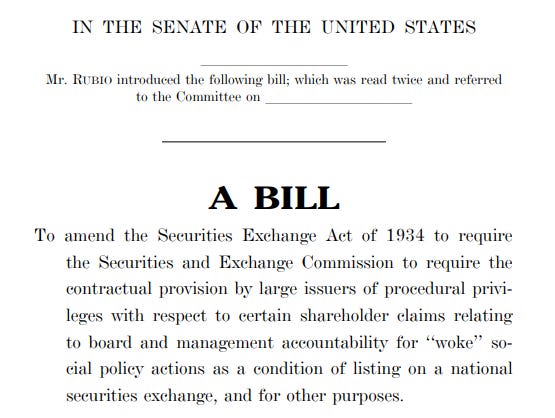
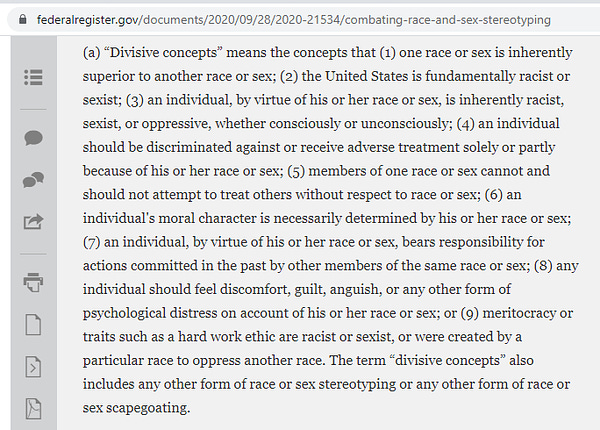
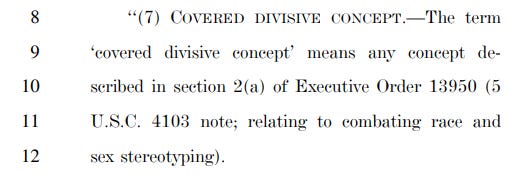
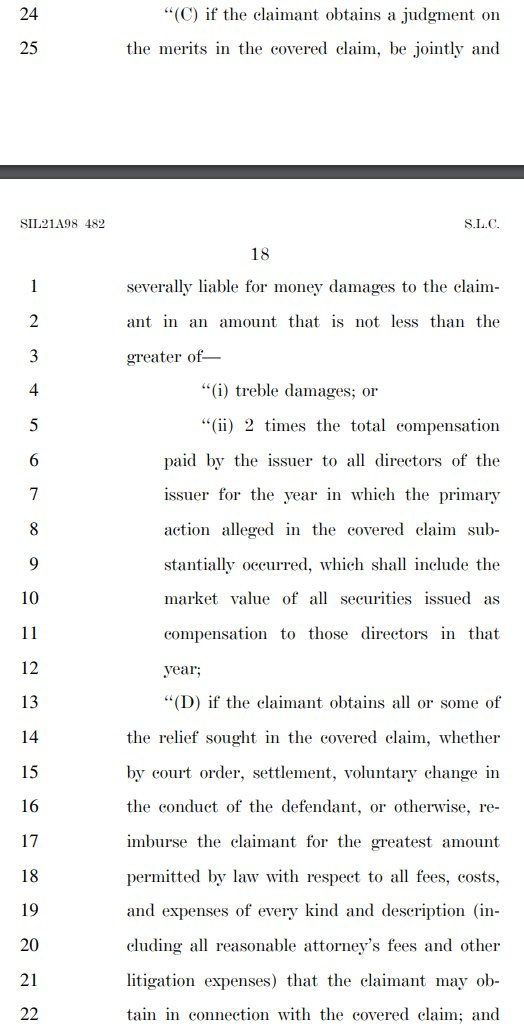

Rubio also is using the Securities Exchange Act as a cudgel. His bill stipulates that compliance with his proposal would be a “condition of listing on a national securities exchange.” While most major corporations are incorporated in a concentration of East Coast states that are business friendly, but also not run by culture-warrior Republicans, and so those states’ laws would usually govern corporate behavior. But Rubio is attempting to use the SEC as a workaround vehicle to their various state laws regarding corporations and fiduciary duty.
Very free-market and small-government and not at all a boon to trial lawyers. Sheesh.
I will give credit to Rubio’s staff in one respect: His bill, while it would face many constitutional challenges, is more cleverly conceived and written than some of the bills proposed by his younger compatriots on the House side. Rubio’s bill also relies on definitions from an executive order that President Trump issued and President Biden rescinded.
And that’s why the proposal, even though it stands no realistic chance of passing, is nevertheless damaging. The Marco Rubio who shocked the Republican establishment when he came to office a decade ago would have scorned such a proposal. But that was the old Marco Rubio. Now we have a new Marco Rubio who supports union pushes to stick it to Amazon.
Rubio is offering this performative proposal with one thing in mind: differentiating himself from his potential rivals for the 2024 Republican presidential nomination. He knows he can’t really strike a blow against wokeism, so he will strike a pose instead.
But in doing so, he is further forsaking the sensible small-government, free-market ideas that his party once stood for and that he once fought for. Maybe he just wants GOP voters to forget all the bad things he said about Donald Trump, too.





